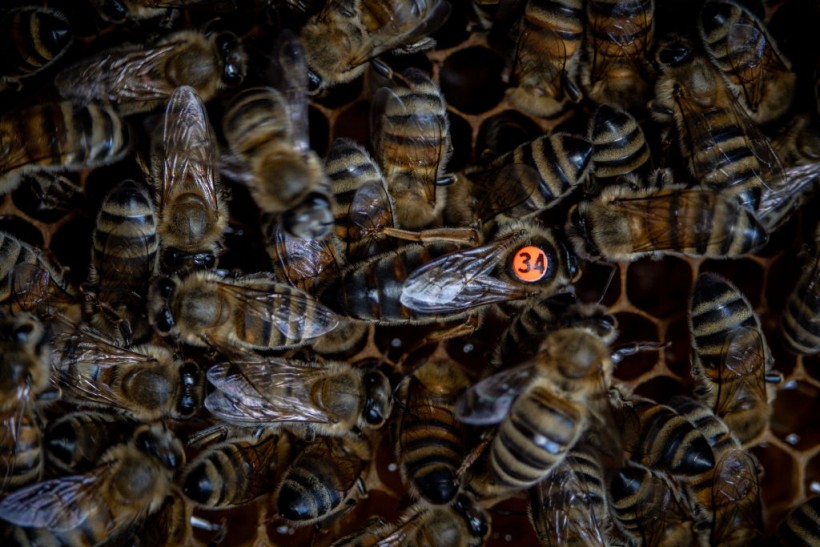Bees are essential for pollinating crops and maintaining biodiversity, but they are under threat from pesticides that are becoming more toxic to them over time.
A new study shows that the impact of pesticides on bees has doubled in a decade, despite a decrease in the amount of pesticides used.
Pesticides are more harmful to bees than ever
 (Photo : Chris McGrath/Getty Images)
(Photo : Chris McGrath/Getty Images)

The study, published in the journal Science, used US government data on pesticide use and toxicity from 1992 to 2016.
The researchers found that modern pesticides have lower toxicity to people, wild mammals and birds, but higher toxicity to invertebrates, such as bees and other pollinators.
The study also showed that the toxicity of pesticides used on genetically modified crops was similar to that of conventional crops, contradicting the claim that GM crops would reduce the need for pesticides.
They calculated the "total applied toxicity" of pesticides, which measures the amount and potency of the chemicals, and found that the total applied toxicity to bees and aquatic insects increased by a factor of two from 2005 to 2015, while the total applied toxicity to mammals and birds decreased by a factor of nine.
This means that the pesticides are more selective and harmful to the insects that are vital for pollination and ecosystem health.
The study's lead author, Prof Ralf Schulz, of the University Koblenz and Landau in Germany, said: "Compounds that are particularly toxic to vertebrates have been replaced by compounds with less vertebrate toxicity and that is indeed a success. But at the same time, pesticides became more specific, and therefore, unfortunately, also more toxic to 'non-target organisms', like pollinators and aquatic invertebrates."
Also Read: Car Pollution: High Ozone Levels Prevent Bees from Searching Flowers for Pollination [Study]
Pesticides can affect generations of bees
Another recent study by researchers at the University of California, Davis, revealed that pesticides can have lasting effects on bee health, reducing their reproduction rate.
The study exposed blue orchard bees to imidacloprid, a common insecticide that mimics nicotine, which is toxic to insects.
The bees were given one application for two years, which is a standard level of exposure.
The study found that bees that came into contact with insecticides as larvae and as adults produced 44% fewer offspring.
And bees that were exposed to the chemical two years in a row had a 72% reduced population growth rate, compared to bees that did not have any exposure.
The researchers concluded that multiple generations of bees may be needed to recover from one pesticide application.
Clara Stuligross, the study's lead author and a UC Davis Ph.D candidate in ecology, said: "Repeated exposure across two years had an additive negative effect on individual reproduction, which led to a really dramatic reduction in population growth."
What can be done to save the bees
Bees are crucial for the production of food, as they pollinate about three-quarters of crops. They also support biodiversity and ecosystem services, such as soil fertility, water quality and climate regulation.
The decline of bees and other pollinators poses a serious threat to global food security and environmental sustainability.
There are several actions that can be taken to protect bees and the environment from the harmful effects of pesticides. Some of these include:
- Reducing the use of pesticides as much as possible, especially when crops and flowers are in bloom, as bees are attracted to plants that produce nectar and pollen.
- Choosing alternative pest control methods, such as biological control, crop rotation, intercropping and organic farming.
- Planting diverse and native flowers and plants that provide food and habitat for bees and other pollinators.
- Supporting bans and restrictions on the most toxic pesticides, such as neonicotinoids, which have been linked to bee declines and are banned in the European Union.
- Educating and raising awareness about the importance of bees and the dangers of pesticides, and encouraging people to take action to help bees.
Bees are still being harmed despite tightened pesticide regulations, study shows. But there is hope and solutions to reverse this trend and ensure the survival of these amazing creatures and the benefits they bring to us and the planet.
Related article: New Study Reveals Bees Could Boost Crops and Stabilize Food Prices Amid Threats of Global Recession and Inflation
© 2024 NatureWorldNews.com All rights reserved. Do not reproduce without permission.



![Climate Change is Reducing Dust Levels Worldwide as Arctic Temperature Warms [Study]](https://1471793142.rsc.cdn77.org/data/thumbs/full/70320/280/157/50/40/climate-change-is-reducing-dust-levels-worldwide-as-arctic-temperature-warms-study.jpg)

